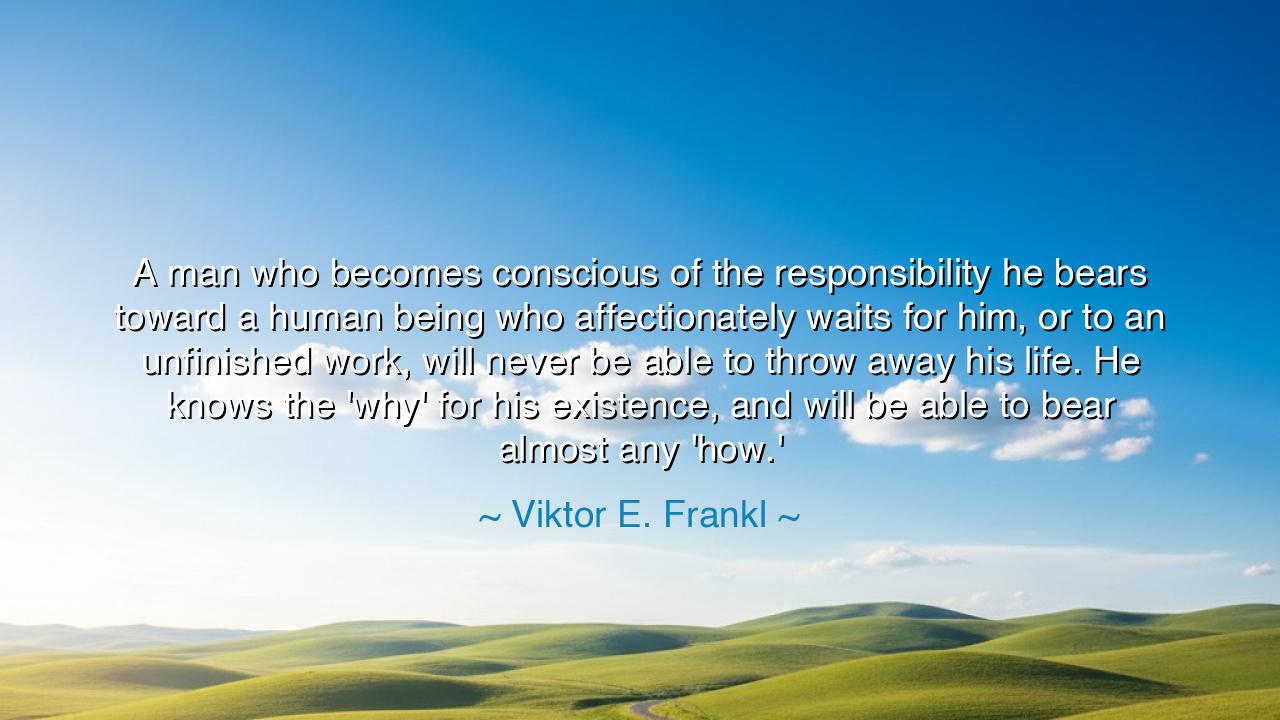
A man who becomes conscious of the responsibility he bears
A man who becomes conscious of the responsibility he bears toward a human being who affectionately waits for him, or to an unfinished work, will never be able to throw away his life. He knows the 'why' for his existence, and will be able to bear almost any 'how.'






The survivor and sage, Viktor E. Frankl, once proclaimed from the depths of suffering: “A man who becomes conscious of the responsibility he bears toward a human being who affectionately waits for him, or to an unfinished work, will never be able to throw away his life. He knows the ‘why’ for his existence, and will be able to bear almost any ‘how.’” These words were born in the crucible of the concentration camps, where despair devoured countless souls, yet Frankl discovered a flame that could not be extinguished: the flame of purpose.
In his vision, the responsibility to another person, or to a task yet incomplete, becomes the anchor of survival. When a loved one waits, when a work remains unfinished, life cannot be discarded, no matter the suffering. This awareness binds the soul to endurance, for it reminds us that our existence is not only for ourselves but entrusted to something greater. To abandon life is to abandon that sacred trust.
Thus Frankl declares the eternal law of meaning: if one has a why, one can withstand almost any how. The body may be beaten, the spirit afflicted, the path covered in darkness, yet the one who knows his reason endures. The why becomes a light in the abyss, a shield against despair, a fire that carries the soul through trials that would otherwise crush it.
This truth is heroic, for it lifts survival beyond instinct. It transforms endurance into devotion, suffering into testimony. The one who bears his cross with knowledge of why rises above mere existence and enters the realm of significance. Even in misery, he lives with dignity, because his life is tethered to love or to duty that transcends the self.
So let this wisdom be passed down: seek always the why of your life. Whether it is love for another soul, or the sacred labor of an unfinished work, let it be the anchor of your endurance. For the storms of existence will come, and the weight of despair will press heavily—but with a why, you can bear any how. And in this lies the strength not merely to survive, but to triumph.






NTNam Tuan
Frankl's quote reminds me of the strength that comes from having both a personal mission and the love of others. When someone is waiting for you, or you have unfinished work that matters, the idea of continuing becomes much clearer. But is it always necessary for our 'why' to be tied to others or external goals? Could there be a more internal or self-driven 'why' that motivates us, and if so, how can we nurture that without relying on outside validation?
LQLingg Quynh
I find Frankl’s concept of responsibility to be profound. It’s not just about having a reason to live but about being accountable to others and to the work we’re doing. I wonder, though, can we ever truly carry the weight of that responsibility alone? Is it possible for someone to find their 'why' without external influences or support? How does the presence of others in our lives shape our sense of responsibility and purpose?
TBthy bao
Frankl’s quote speaks to the strength that comes from having purpose. It’s inspiring to think that knowing why we exist can help us face nearly any hardship. However, what happens when we feel lost or disconnected from that sense of purpose? Is it possible to regain our 'why' when we’ve lost it? What steps can we take to rediscover it, and how do we maintain that motivation when life throws challenges our way?
HNNguyen Hong Nhung
Viktor Frankl’s perspective on responsibility and meaning is incredibly powerful. When we understand the 'why' behind our existence, it gives us a sense of purpose that can help us endure even the toughest circumstances. But I wonder, how do we discover our own 'why'? Is it something we naturally stumble upon, or is it a lifelong process of self-discovery? Can we truly be content without this understanding, or does the search for meaning become an essential part of life?